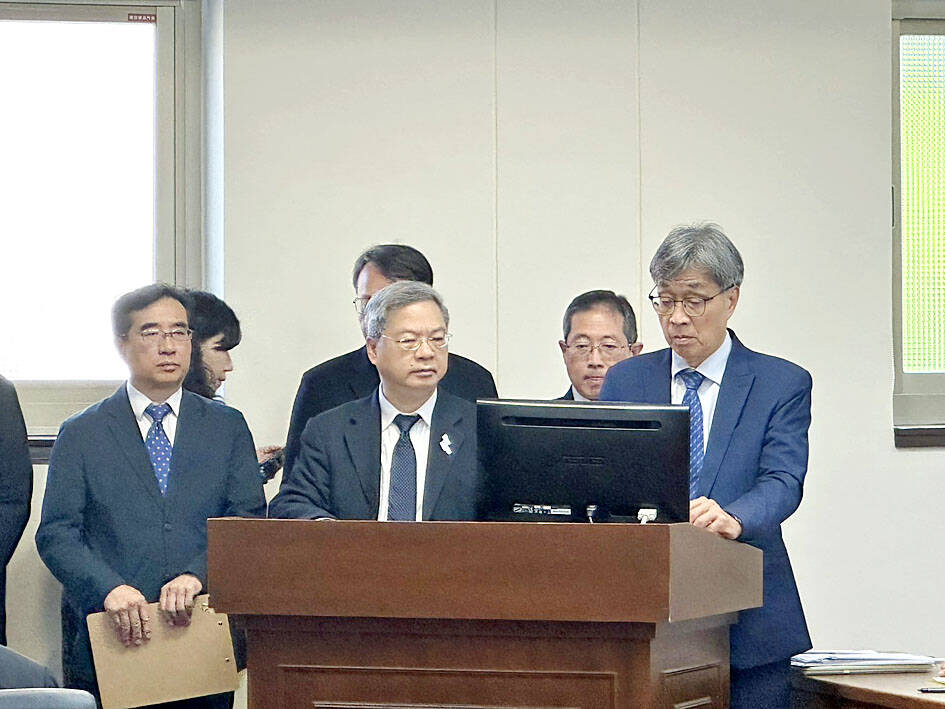The high-speed motor and drone sectors would bear the brunt of Beijing’s newly announced rare earth export curbs, while the semiconductor industry is expected to be indirectly affected, Minister of Economic Affairs Kung Ming-hsin (龔明鑫) said yesterday.
China last week announced new restrictions requiring companies to obtain export licenses if their products contain more than 0.1 percent of Chinese-origin rare earth materials by value.
The effect on the semiconductor industry would likely be indirect, as local chipmakers do not purchase much directly from China, importing most rare earth materials from Japan and most equipment from the US, Kung told reporters on the sidelines of a meeting of the legislature’s Economics Committee.

Photo: Yang Yuan-ting, Taipei Times
The ministry is monitoring the impact the restrictions might have on the local chip supply chain and would propose countermeasures if needed, he said.
Beijing in April already imposed restrictions on some rare earths, making a price increase inevitable, but as they account for a relatively small share of global supply chain costs, the ministry would watch closely to see whether it leads to broader price hikes, Kung added.
Shares in Taiwan yesterday plunged, but recouped part of earlier losses as US President Donald Trump — who on Friday threatened to impose a 100 percent tariff on Chinese goods after Beijing’s rare earths announcement — adopted a more conciliatory stance on Sunday, easing investors’ jitters.
The TAIEX closed down 378.50 points, or 1.39 percent, at 26,923.42, with Taiwan Semiconductor Manufacturing Co (TSMC, 台積電), the most heavily weighted stock on the main board, falling 1.74 percent, while smartphone chip designer MediaTek Inc (聯發科) was down 2.23 percent.
“Bargain hunters emerged to pick large-cap electronics stocks, including TSMC as US stock futures rebounded, pointing to a possible higher opening on the spot market after Trump softened his tone,” Concord Securities Co (康和證券) analyst Kerry Huang (黃志祺) said. “Many investors still have high hopes that the US and China are expected to sit down to resolve the trade issues.”
Nevertheless, China yesterday held its position, calling for Trump to withdraw his latest tariff threat and other export control measures announced over the weekend.
“China urges the US to promptly correct its erroneous practices,” Chinese Ministry of Foreign Affairs spokesman Lin Jian (林劍) said. “If the US insists on going its own way, China will certainly take resolute measures to safeguard its legitimate rights and interests.”
Economic indicators show that the retaliatory actions and uncertainty are affecting trade between the two countries. Chinese trade data released yesterday showed that exports to the US have fallen for six consecutive months, dropping 27 percent last month from a year earlier.
Additional reporting by CNA and AP

In Italy’s storied gold-making hubs, jewelers are reworking their designs to trim gold content as they race to blunt the effect of record prices and appeal to shoppers watching their budgets. Gold prices hit a record high on Thursday, surging near US$5,600 an ounce, more than double a year ago as geopolitical concerns and jitters over trade pushed investors toward the safe-haven asset. The rally is putting undue pressure on small artisans as they face mounting demands from customers, including international brands, to produce cheaper items, from signature pieces to wedding rings, according to interviews with four independent jewelers in Italy’s main

Japanese Prime Minister Sanae Takaichi has talked up the benefits of a weaker yen in a campaign speech, adopting a tone at odds with her finance ministry, which has refused to rule out any options to counter excessive foreign exchange volatility. Takaichi later softened her stance, saying she did not have a preference for the yen’s direction. “People say the weak yen is bad right now, but for export industries, it’s a major opportunity,” Takaichi said on Saturday at a rally for Liberal Democratic Party candidate Daishiro Yamagiwa in Kanagawa Prefecture ahead of a snap election on Sunday. “Whether it’s selling food or

CONCERNS: Tech companies investing in AI businesses that purchase their products have raised questions among investors that they are artificially propping up demand Nvidia Corp chief executive officer Jensen Huang (黃仁勳) on Saturday said that the company would be participating in OpenAI’s latest funding round, describing it as potentially “the largest investment we’ve ever made.” “We will invest a great deal of money,” Huang told reporters while visiting Taipei. “I believe in OpenAI. The work that they do is incredible. They’re one of the most consequential companies of our time.” Huang did not say exactly how much Nvidia might contribute, but described the investment as “huge.” “Let Sam announce how much he’s going to raise — it’s for him to decide,” Huang said, referring to OpenAI

The global server market is expected to grow 12.8 percent annually this year, with artificial intelligence (AI) servers projected to account for 16.5 percent, driven by continued investment in AI infrastructure by major cloud service providers (CSPs), market researcher TrendForce Corp (集邦科技) said yesterday. Global AI server shipments this year are expected to increase 28 percent year-on-year to more than 2.7 million units, driven by sustained demand from CSPs and government sovereign cloud projects, TrendForce analyst Frank Kung (龔明德) told the Taipei Times. Demand for GPU-based AI servers, including Nvidia Corp’s GB and Vera Rubin rack systems, is expected to remain high,